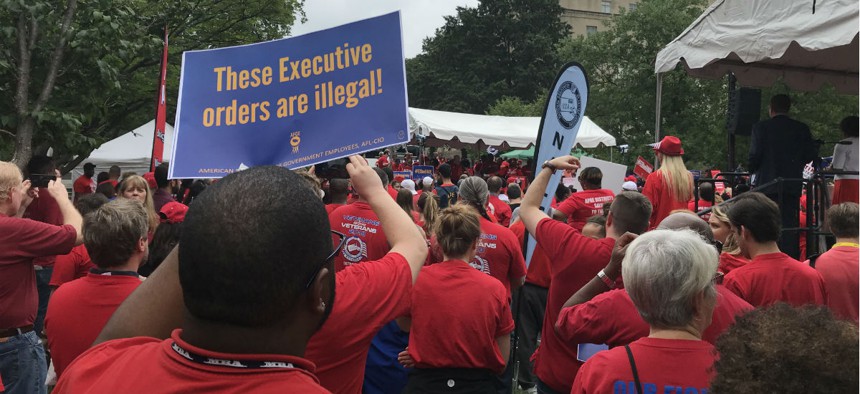
Federal workers protest President Trump's executive orders curbing civil service protections in Washington prior to a federal court hearing July 25. Eric Katz/GovExec
Unions Demand Swift Reversal of Agency Policies After Court Decision
Justice Department says it is evaluating potential next steps after a judge invalidated most elements of President Trump’s three workforce executive orders.
Federal employee unions on Monday demanded that agencies roll back recent changes to workplace policies after a federal judge ruled that most of the key provisions in President Trump’s recent workforce executive orders violated federal law.
Over the weekend, U.S. District Court Judge Ketanji Brown Jackson issued a 122-page ruling that the Trump administration’s executive orders, which made it easier to fire federal workers and reduced the influence of unions, “eviscerate the right to bargain collectively,” in conflict with the 1978 Civil Service Reform Act.
Among the provisions found to be unlawful were efforts to set time limits on collective bargaining negotiations, the removal of a variety of issues from administrative grievance procedures, and severe restrictions on union employees’ use of official time.
On Monday, federal unions reported that agencies have not yet begun to restore recently stripped union rights, particularly with regard to official time or access to agency-provided office space, although they said they are in discussions with agency managers.
“We’re starting to put pressure on them today, and we plan to do it all this week,” said J. David Cox, national president of the American Federation of Government Employees. “They poorly planned this roll out, and they knew that this lawsuit was pending. But most offices are treating people today just like they treated them on Friday, and where we still have official time and are operating, they’re continuing to hold them out of offices, like at [the Social Security Administration].”
The White House directed questions on the decision to the Justice Department. In an email to Government Executive, Justice Department spokesman Andy Reuss said the administration is examining its options going forward.
“We are disappointed in the ruling and are considering the appropriate next steps to ensure the president is able to fulfill his constitutional duties, run an effective and efficient government, and protect taxpayers from waste and abuse,” Reuss said.
The National Federation of Federal Employees, which is a member of the 13-union Federal Workers Alliance, is demanding agencies roll back workplace policies to May 24, the day before Trump issued the executive orders.
“We’re going to be directing all of our locals to notify management of the decision and to require that they respect the injunction and immediately move to undo any illegal implementation that they engaged in,” said NFFE General Counsel Jeff Friday. “We’re hopeful that the government won’t flout the authority of a federal judge, but that remains to be seen.”
Cox said that if agencies do not move quickly to restore unions’ access to programs like official time, AFGE will file additional lawsuits to enforce the ruling.
“We’re definitely moving as aggressively as we can,” he said. “Either they’ll restore these people back to official time, or give their offices back, or we’ll crank up the litigation. That’s just the way it’s going to be.”
And the National Treasury Employees Union is demanding negotiators return to the bargaining table and rescind so-called “last, best offers” in collective bargaining talks that attempted to implement the executive orders’ provisions.
“NTEU is preparing to officially contact agency negotiators where we have open contracts, and where the agencies have proposed contract language in accordance with the president’s three executive orders, demanding that the negotiators return to the table ready to bargain in good faith,” said NTEU National President Tony Reardon. “At the Department of Health and Human Services, the agency walked away from the table after only two days of bargaining. Its bargaining approach and proposals in its first and last, best offer were straight from the dictates in the executive orders that a federal judge has now found unlawful.”
Unions also are still examining their options with regard to portions of the executive orders that Brown Jackson upheld as consistent with existing law, particularly provisions stating management is not obligated to engage in progressive discipline with poor performing federal workers and stating that agencies can unilaterally implement their last, best offer if they deem unions to be bargaining in bad faith.
“What the judge said is the way those issues were discussed in the executive orders were nothing but a restatement of the current law, and I tend to agree with that,” Friday said. “But the [Federal Workers Alliance’s] legal team will be meeting later today about that issue.”
Cox said that AFGE is “exploring all of [its] options” with regard to the provisions upheld in the ruling.







